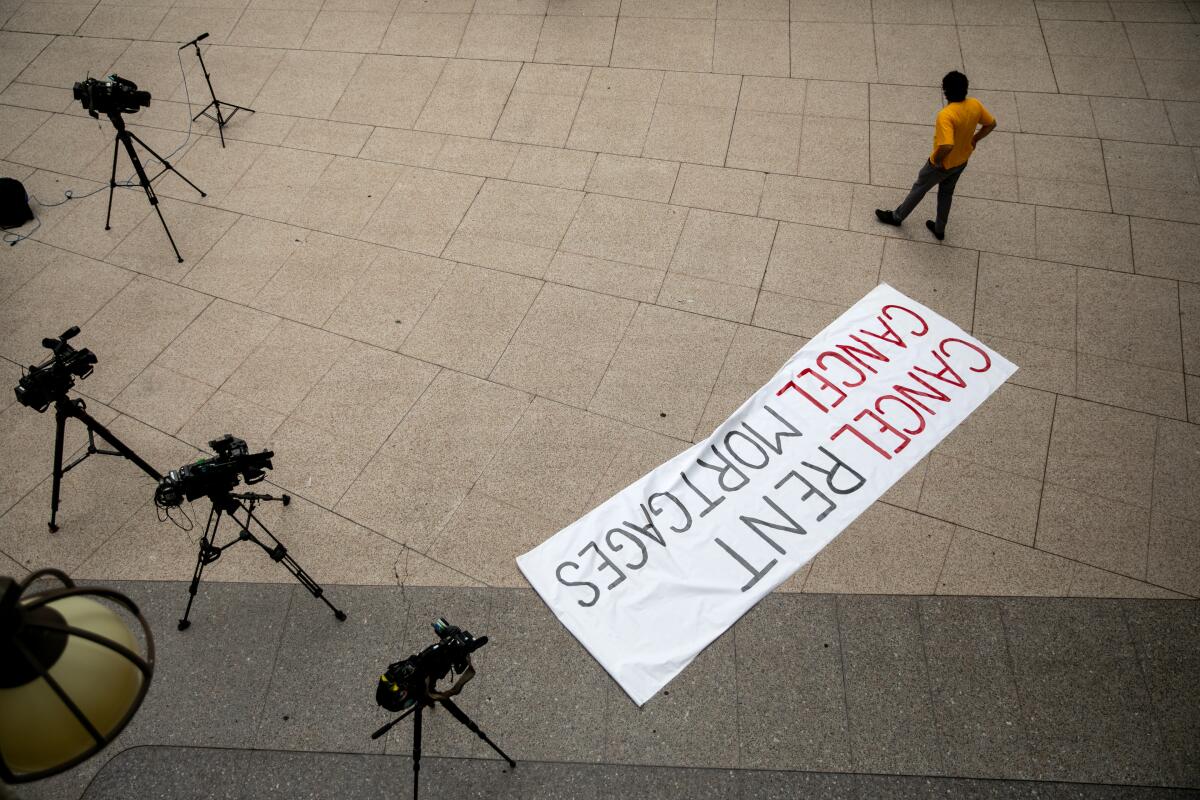California legislative leaders ask courts to keep coronavirus eviction ban in place

- Share via
SACRAMENTO — California’s legislative leaders are asking the state’s Judicial Council for more time before renter evictions resume during the COVID-19 pandemic, saying they are facing “an impossible decision” between rushing legislation and leaving millions of tenants unprotected.
Most evictions in the state were suspended in April after California courts stopped processing nearly all cases. Gov. Gavin Newsom gave the court system the power to stop evictions in an emergency order in late March, intended to allow “maximum flexibility” in responding to the pandemic. At the time, the Legislature was on an extended break to reduce the spread of coronavirus in the state Capitol.
Now, with the state Legislature back in session and facing decisions on hundreds of bills before adjourning on Aug. 31, the Judicial Council, which oversees the state’s court system, could lift the suspension on evictions as early as Aug. 14. Chief Justice Tani Cantil-Sakauye, who leads the Judicial Council, said the decision should fall on the Legislature and the governor.
In a letter sent Wednesday, Senate Pro Tem Toni Atkins (D-San Diego) and Assembly Speaker Anthony Rendon (D-Lakewood) said that timeline would create two-and-a-half weeks of “chaos” if evictions resume amid the pandemic.
Rendon and Atkins asked that the Judicial Council consider resuming eviction proceedings on Sept. 5 in order to prevent a gap in tenant protections if the Legislature passes an urgency bill and Newsom signs it into law.
The legislative leaders told Cantil-Sakauye that fast-tracking tenant legislation would not allow for sufficient vetting of the measures and could increase the risk of spreading the virus in the state Capitol during hearings.
“Speeding up the legislative process is nearly impossible, given the current precautions needed to reduce the risk of viral transmission during legislative business,” Atkins and Rendon wrote.
The Judicial Council was originally poised to vote in June on whether to resume evictions, but opted instead to give Newsom and legislative leaders more time. The Legislature delayed its return last month from summer recess after several staffers and members in the Legislature tested positive for COVID-19.
Without the statewide ban, tenant protections vary by city and often require renters to make court appearances to avoid eviction when falling behind on rent.
Expanded unemployment benefits also expired at the end of July, prompting fears among tenants, landlords and housing advocates that a wave of evictions is ahead in the coming months.
Two of the most prominent eviction protection bills being considered by the Legislature — Assembly Bill 1436 and Senate Bill 1410 — are scheduled to be heard in committee in mid-August.
“Even after bills are considered in committee in mid-August, it would still require a considerable amount of time before either could meet other legislatively required milestones necessary for them to be passed by both houses and transmitted to the governor,” the lawmakers wrote in their letter Wednesday.
A spokesperson for the Judicial Council did not immediately respond to a request for comment.
Both AB 1436 and SB1410 would halt evictions during the COVID-19 pandemic and give tenants more time to repay overdue rent.
AB 1436 by Assemblyman David Chiu (D-San Francisco) would also provide mortgage forbearance to property owners, including struggling landlords. SB 1410 by state Sen. Anna Caballero (D-Salinas) would include tax breaks to landlords when tenants can’t pay rent.
“We can’t allow a wave of massive evictions, it would be catastrophic for COVID-19 spread,” said Chiu, who signed onto the letter with Rendon and Atkins. “We appreciate the role the Judicial Council has played during the pandemic around evictions and we hope to resolve these issues in the eviction process.”
More to Read
Sign up for Essential California
The most important California stories and recommendations in your inbox every morning.
You may occasionally receive promotional content from the Los Angeles Times.











